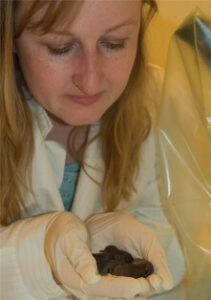
BJ Casey, Ph.D.
Director of Sackler Institute for Developmental Psychobiology
Professor of Developmental Psychobiology
Weill Medical College of Cornell University

BJ Casey, Ph.D.
Director of Sackler Institute for Developmental Psychobiology
Professor of Developmental Psychobiology
Weill Medical College of Cornell University
“Easy to Remember, Difficult to Forget: The Development of Fear Regulation”
Abstract: Fear extinction learning is a highly adaptive process that involves the integrity of frontolimbic circuitry. Its disruption has been associated with emotional dysregulation in stress and anxiety disorders. This presentation will examine how age, genetics and experiences shape our capacity to regulate fear in cross-species studies. Evidence for adolescent-specific diminished fear extinction learning will be presented in the context of immature frontolimbic circuitry. Evidence for less neural plasticity in fear regulation as a function of early life stress and genotype also will be presented. Finally, this work will be discussed in the context of exposure-based behavioral therapies for the treatment of anxiety and stress disorders, speculating on how such therapies may be optimized for the individual based on the patient’s age, genetic profile and personal history to move from standard treatment of care to personalized and precision medicine.
Wednesday, October 15, 2014
The Child Study Center’s 2014 Lois Bloom Lecture
4:15 p.m., The Nittany Lion Inn, Boardroom

Phil Fisher, Ph.D.
Professor of Psychology
Senior Scientist, Oregon Social Learning Center (OSLC)
University of Oregon

Phil Fisher, Ph.D.
Professor of Psychology
Senior Scientist, Oregon Social Learning Center (OSLC)
University of Oregon
“Interventions to Promote Positive Outcomes Following Adverse Childhood Experiences”
Abstract: This presentation will focus on two parallel and interrelated domains of research: Investigations that characterize specific dimensions of early adversity (e.g., neglect, prenatal substance exposure) as they impact children’s psychological and neurobiological development; and prevention science studies that comprise theory driven experiments to evaluate intervention programs for infants and young children. We will describe how research in each area can reciprocally impact work in the other area, and how the confluence of this activity may be employed to impact social policy towards vulnerable children and families. Examples will be drawn from the presenter’s own prior and current research.
Dr. Fisher is also presenting the BENNETT LECTURE
Thursday, October 23, 2014
4:00 p.m., 22 BBH Building
“Convergent Thinking: The Neuroscientific Intersection of Next-Generation Parenting Interventions”
Wednesday, October 22, 2014
4:15 p.m., The Nittany Lion Inn, Alumni Lounge

Tracy Dennis, Ph.D.
Professor of Psychology
Hunter College and the Graduate Center of The City University of New York

Tracy Dennis, Ph.D.
Professor of Psychology
Hunter College and the Graduate Center of The City University of New York
“Mental Health on the Go: Biobehavioral Effects of Computerized and Mobile Attention Bias Modification for Anxiety”
Abstract: Anxiety and stress-related disorders are not only the most common of the psychiatric disorders but have a broad negative impact on physical health and positive adjustment. However, millions fail to seek or receive treatment due to high cost and low accessibility of evidence-based treatments, particularly in underserved communities, where the prevalence of stress-related disorders is highest. Given this public health crisis, research on alternative delivery systems that are more affordable, accessible, and engaging, such as computerized interventions and mobile and gamified applications or “apps”, has grown. Yet, this field of study is in its infancy. Recent advances in the understanding of the role of cognitive biases in stress and anxiety have led to the development of computerized interventions targeting the threat bias, or excessive attention to threat. Computerized attention bias modification training (ABMT) techniques that train attention away from threat stimuli result in reduced anxiety severity and stress reactivity comparable to the effect size of a typical 12-session cognitive behavioral therapy. Moreover, ABMT may bootstrap the efficacy of other treatments for anxiety and stress-related disorders across the lifespan and bolster general executive functions that support self-regulatory capacity. Therefore, ABMT, which is brief and cost-effective, may represent an optimal alternative treatment delivery approach. However, how and for whom ABMT is most effective remains unclear and the degree to which ABMT can be embedded in a mobile or gamified format and its potential for transfer of benefits are unknown. In this talk, Dr. Dennis presents a series of studies using computerized ABMT that leverage the sensitivity and specificity of scalp-recorded event-related potentials (ERPs) to identify both neurocognitive changes associated with ABMT and individual differences predicting its stress- and anxiety-reducing effects. Building on these findings, she then presents two studies documenting positive behavioral and neurocognitive effects of a gamified ABMT mobile application administered on a smartphone in trait anxious adults. Findings add to the growing body of research demonstrating that evidence-based treatment mechanisms can be embedded into mobile and gamified formats, particularly those that target cognitive biases. Moreover, results identify potential neurocognitive bases for stress-reduction effects of computerized and gamified ABMT.
Thursday, December 11, 2014
4:15 p.m., 127 Moore Building

Ned H. Kalin, M.D.
Hedberg Professor and Chair
Department of Psychiatry
University of Wisconsin School of Medicine and Public Health

Ned H. Kalin, M.D.
Hedberg Professor and Chair
Department of Psychiatry
University of Wisconsin School of Medicine and Public Health
“Neurodevelopmental Risk Factors Leading to Anxiety and Depression”
Abstract: Dr. Kalin is among the most accomplished biological psychiatrists in the field. His research combines molecular, preclinical animal models, and human functional imaging studies to elucidate the mechanisms underlying the pathophysiology of anxiety and affective disorders. His work focuses on using translational models in nonhuman primates to elucidate early life mechanisms underlying the development of anxiety and depression. Using the nonhuman primate, he has also established early markers of the risk to develop psychopathology, which has proved to be relevant to understanding risk in children. In rodent models, he has pursued the mechanism identified in nonhuman primates and in humans he has performed imaging studies related to understanding mechanisms underlying emotion regulation. He is currently translating findings from his nonhuman primate studies to young children by examining alterations in brain regions underlying emotion regulation in children with high levels of anxious temperament.
Co-Sponsored with the Department of Biobehavioral Health
Monday, February 9, 2015
3:30 – 4:30, Pike Auditorium, Biobehavioral Health Building

Valerie Shafer, Ph.D.
Speech-Language-Hearing Sciences
Graduate School and University Center
City University of New York

Valerie Shafer, Ph.D.
Speech-Language-Hearing Sciences
Graduate School and University Center
City University of New York
“Using Electrophysiology to Understand Developmental Language Disorders”
Abstract: This talk describes application of neurophysiological measures to the study of developmental language disorders. Neurophysiological methods provide valuable information regarding the underlying neural processes that lead up to behavior. They are particularly useful for evaluating similarities/differences in minimally verbal populations, such as infants, toddlers and children with severe language delays. Examples of study design and results from studies of infants, children with Specific Language Impairment (SLI) and children with Autism Spectrum Disorders (ASD) will be presented to illustrate the utility of the method for investigating the nature of language development and developmental language disorders. Future directions for research will be discussed, particularly with regards to the value of various techniques for analyzing neurophysiological data that are currently being promoted.
Co-Sponsored by: the Linguistics Program and the Center for Language Science
Thursday, February 26, 2015
4:15 p.m., 127 Moore Building

Christopher Browning, Ph.D.
Professor of Sociology
The Ohio State University

Christopher Browning, Ph.D.
Professor of Sociology
The Ohio State University
“Activity Spaces and Youth Development: Preliminary Findings from the Adolescent Health and Development in Context (AHDS) Study”
Abstract: Research examining contextual influences on child health and behavior has entered a new era of possibility. The availability of mobile technology for GPS tracking and real-time assessment has opened the door to collection of far more precise data on everyday sociospatial contexts. This presentation describes the Adolescent Health and Development in Context (AHDS) project – a large scale, longitudinal study of youth in Franklin County, Ohio focused on the nature and developmental consequences of routine activity space exposures. In addition to the major research questions and theoretical approach motivating the study, I review key features of the study design: (1) cellphone-based GPS tracking over the course of a week; (2) Ecological Momentary Assessments of location, activities, network partner presence, risk behaviors, and immediate social environments several times a day during the week; (3) follow-up interview-based collection of detailed space-time budget data on five of the seven days. Preliminary results highlight the relevance of activity space exposures for understanding youth outcomes, including day-to-day variability in physiological stress (as captured by nightly measures of salivary cortisol). New technologies and data collection methods hold the potential to significantly advance understanding of contextual influences on youth health and well-being.
Thursday, April 2, 2015
4:15 p.m., 127 Moore Building

Karen Bales, Ph.D.
Vice Chair, Professor
Department of Psychology
University of California, Davis

Karen Bales, Ph.D.
Vice Chair, Professor
Department of Psychology
University of California, Davis
“The Biology of Fathering”
Abstract: Care of offspring by males is rare among mammals, but is seen in a number of rodent and primate species, including humans. Research on its biological and neurobiological substrates is just now coming of age. Candidate hormones have included prolactin, corticosteroids, oxytocin, and vasopressin, among others. In addition, animal research has shed light on the long-term effects of fathering on offspring’s behavioral and neural development. In this talk I will present our current state of knowledge regarding the biological regulation of male parenting, referring to my own research in prairie voles and titi monkeys as well as research by others in humans, marmosets, and California mice.
Thursday, April 23, 2015
4:15 p.m., 127 Moore Building